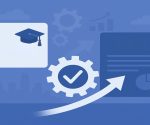Many students and working professionals wonder if they can pursue the CFA course without a finance background. Even without a degree in finance or commerce, candidates from science, engineering, medicine, or IT can pursue the CFA course. The term CFA non-finance background refers to students or professionals from non-commerce or non-finance academic fields who wish to enter the investment and finance industry by completing the CFA program. They may come from science, technology, the arts, law, or any unrelated discipline. A CFA charter can open the door to a rewarding finance career even for those with no finance degree. If you are planning a career switch to finance, an engineer, a doctor, a science student, or even a fresh graduate, this article explains how to make that dream a reality.
Can You Pursue CFA Without a Finance Background?
Many non-commerce students question whether the CFA program is for them. The CFA Institute welcomes candidates from all academic fields. The only requirement is a passion for finance and the ability to commit to a rigorous study schedule.
CFA Eligibility for Engineers and Non-Commerce Graduates
Engineering students, science graduates, and IT professionals can sit for the CFA Level 1 exam if they meet the eligibility conditions. These include:
- A bachelor’s degree (or being in the final year of graduation)
- Work experience of at least 4,000 hours over 3 years if not holding a degree
- A valid passport
This makes CFA eligibility for engineers and other non-finance candidates equal to those from commerce backgrounds. Many non-finance students prepare for the CFA as early as college. They do this because the CFA program focuses more on understanding and application than rote memorisation. Even without accounting or economics knowledge, candidates can master the curriculum with dedicated efforts.
How to Become a CFA Without a Finance Background?
Starting the CFA journey without any exposure to finance may seem harsh. But understanding the syllabus structure helps.
| CFA Level | Focus Area |
| Level 1 | Tools and concepts for investment valuation |
| Level 2 | Asset valuation and real-world case analysis |
| Level 3 | Portfolio management and wealth planning |
The CFA Level 1 curriculum is beginner-friendly. It introduces financial tools and ethical standards, which are key to building your financial foundation. Candidates often use prep providers offering the best CFA prep for non-finance students. These courses simplify concepts with real-life examples and ensure learners are not overwhelmed.
Why CFA Is a Smart Career Move for Non-Commerce Graduates?
Pursuing CFA can be a game-changer for IT, science, or medicine professionals. The global demand for finance professionals is increasing, and the CFA charter is globally recognised.
Career Switch to Finance Through CFA
CFA helps non-commerce students make a career switch to finance without pursuing another full-time degree like an MBA. The CFA curriculum teaches:
- Investment tools
- Financial analysis
- Portfolio management
- Wealth planning
These skills make candidates job-ready for financial analyst, portfolio manager, and equity research associate roles. The program also improves problem-solving skills, which are crucial in finance.
A CFA for non-commerce students is not just about earning a certificate. It helps them build credibility and earn respect in a new industry. Even companies recognise the CFA charter as proof of strong commitment and capability.
CFA for Science Students, Doctors, and IT Professionals
Science students and doctors find opportunities in healthcare investment research, biotech equity analysis, or pharmaceutical consulting. CFA for doctors can open paths to investment firms focusing on the health sector. CFA for IT professionals is becoming a popular path. Financial technology, or FinTech, needs tech experts who understand finance. CFA gives IT professionals the finance part, making them a valuable asset in this fast-growing industry.
CFA Non-Finance Background: Challenges and Success Strategies
Starting CFA with no finance knowledge presents unique challenges. But with the right plan, every candidate can succeed. The key lies in understanding the structure, adapting study habits, and staying consistent.
CFA Exam Without Finance Knowledge
The CFA exam without finance knowledge can feel tough initially. Candidates often find topics like:
- Financial reporting (accounting)
- Quantitative methods (statistics)
- Economics
Difficult in the beginning. However, the curriculum is structured to help candidates build up gradually. Candidates from a CFA non-commerce background should spend extra time on the basics. They can gain familiarity with beginner books or videos on accounting and finance. Candidates must also manage time well. Most people need 300+ hours of preparation for each level. A well-structured study plan is a must.
CFA Study Tips Non-Finance
Here are the most effective CFA study tips non-finance candidates can follow:
- Start early and allocate more time to complex subjects
- Use topic-specific flashcards and summaries
- Focus on practice questions
- Study with peers or join a study group
- Watch conceptual videos before reading textbooks
- Read the CFA Institute’s curriculum when confused
This approach makes preparation less stressful. Candidates must avoid passive reading and focus on active learning through problem-solving. Joining the right prep provider helps bridge knowledge gaps. Look for the best CFA prep for non-finance that focuses on simplifying concepts and offers interactive learning.
Step-by-Step Guide to Start CFA Preparation Without Finance Knowledge
Starting the CFA journey from scratch is entirely possible. Many successful CFA charterholders began without a finance degree.
CFA Level 1 for Beginners
CFA Level 1 for beginners is the best time to build a strong base. Start by understanding the ten topic areas:
- Ethical and Professional Standards
- Quantitative Methods
- Economics
- Financial Reporting and Analysis
- Corporate Issuers
- Equity Investments
- Fixed Income
- Derivatives
- Alternative Investments
- Portfolio Management
Begin with ethics and quantitative methods. These two are easiest for new learners and boost early confidence. Use simple study materials and revise often.
Steps to Prepare Without a Finance Background
- Get the syllabus: Download the official CFA Institute curriculum.
- Understand the exam format: Learn the topic weightage and question style.
- Start from basics: Use beginner books on accounting and economics if needed.
- Make a 6-month study plan: Study 10–12 hours per week.
- Use video lectures: These help break complex topics into simple explanations.
- Practice every week: Try mock questions after each reading.
- Track progress: Keep weekly goals and adjust when needed.
Non-commerce students often need to study a bit more. But this extra effort pays off. The CFA course is challenging for everyone, even for commerce students. The exam success depends more on dedication than background.
Is CFA Worth It for Non-Finance Professionals?
Many students and professionals from science, engineering, IT, or medicine ask, Is CFA worth it if I don’t have a finance degree? The simple answer is yes. The CFA course can help non-finance professionals change their careers, increase job options, and build a new skill set.
Why CFA Is Valuable for Career Switchers
The CFA program teaches important finance subjects like accounting, investments, and portfolio planning. It trains candidates to think like financial experts. Even if someone studied computers or medicine, they can use CFA to learn these topics and work in banks, investment firms, or as analysts. CFA for career changers is very popular. Companies respect CFA holders because they know the person worked hard and learned complex ideas. This trust makes hiring easier, even for non-finance people. Also, CFA without a finance degree shows how skilled and serious a candidate is. Many firms prefer hiring CFA candidates over MBA graduates because CFA training focuses only on finance and investments.
What Jobs Can You Get with CFA Without a Finance Degree?
CFA opens many doors, even for people without a finance background. Whether the candidate is an engineer, a doctor, or an IT specialist, new career options are possible after completing the CFA. After passing the CFA exams, non-commerce students can apply for jobs like:
| Job Role | Industry |
| Financial Analyst | Banks, MNCS, Corporates |
| Equity Research Associate | Investment Firms, Brokerages |
| Portfolio Manager | Mutual Funds, Hedge Funds |
| Risk Analyst | Insurance, Banking Sector |
| Business Analyst | FinTech, IT-Finance |
| Credit Analyst | Credit Rating Agencies |
These roles do not always need a finance degree. Employers look for skills, not past degrees. With CFA, even a science or arts graduate can work in top firms if they understand the work and can apply the knowledge learned. CFA for IT professionals often leads to FinTech or data-driven finance jobs. These professionals combine their tech skills with finance to work in automation, analytics, or investment software. CFA for science students or even CFA for doctors creates new paths in healthcare investing, biotech analysis, or pharmaceutical finance roles. These niches value domain knowledge plus finance skills.
How Hard is CFA Without Finance?
Studying for the CFA without any finance background can feel tough. However, thousands of students from non-commerce fields pass the exams each year. Understanding the challenges helps candidates prepare better.
Real Challenges Faced by Non-Finance Candidates
Candidates from non-commerce fields face difficulty in:
- Accounting and Financial Reporting: This topic is new for science or engineering graduates.
- Economics: Non-finance candidates may struggle with economic models and market theories.
- Quantitative Methods: Though engineers handle numbers well, understanding financial application needs requires practice.
Learning these topics from zero needs time. However, every CFA topic is explained clearly in the official books. Also, online prep courses for CFA Level 1 for beginners make learning easier.
Smart Tips to Overcome Challenges
- Start early and learn the basics from free videos or beginner books.
- Use simple guides focused on CFA for non-commerce students.
- Watch topic-wise lectures before reading the material.
- Practice small topic tests to build confidence.
CFA Non Finance Background FAQs
- Can a person with a non-finance background do the CFA?
Yes, CFA is open to graduates from all backgrounds. However, non-finance candidates may need more time to grasp core finance topics. Extra effort in subjects like accounting and quantitative methods is recommended.
- Is CFA worth it for non-finance professionals?
Definitely, especially if you’re planning to switch to a finance career, it adds credibility and bridges your knowledge gap. Many engineers and science grads have successfully transitioned via CFA.
- Can CFA be done without work experience?
Yes, you can register and pass the exams without prior experience. However, the charter is awarded only after completing 4,000 hours of relevant professional work. It’s best to combine your studies with internships or job roles.
- What is the lowest salary of a CFA?
Freshers with only Level 1 or 2 may earn ₹4–6 LPA in India. Salary increases with experience, CFA level, and company size. Soft skills and domain knowledge also impact packages.
- What subjects should non-finance CFA aspirants master first?
Begin with Quantitative Methods, Economics, and Financial Reporting. These build foundational understanding for advanced levels. Use videos or coaching for conceptual clarity.


